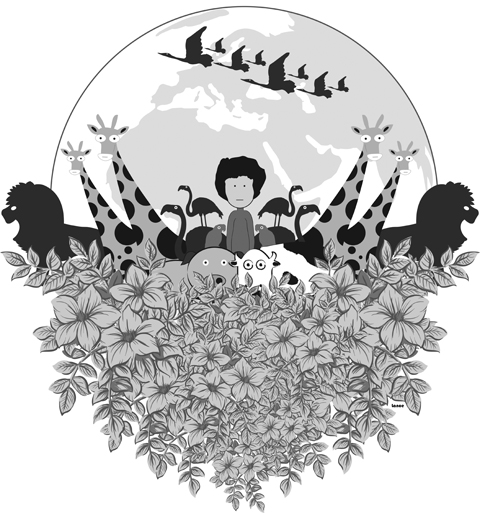The “alarming” rate at which species are being lost could have a severe effect on humanity, conservationists warned on Monday. Targets set eight years ago by governments to reduce biodiversity loss by this year have not been met, experts confirmed at a UN meeting in Nairobi, Kenya.
The third Global Biodiversity Outlook report said loss of wildlife and habitats could harm food sources and industry, and exacerbate climate change through rising emissions.
Achim Steiner, the executive director of the UN Environment Program (UNEP), said: “Humanity has fabricated the illusion that somehow we can get by without biodiversity or that it is somehow peripheral to our contemporary world: The truth is we need it more than ever on a planet of 6 billion [people], heading to over 9 billion by 2050. Business as usual is no longer an option if we are to avoid irreversible damage to the life-support systems of our planet.”

The report confirms what a coalition of 40 conservation organizations said last month, when they claimed there have been “alarming biodiversity declines.” The coalition said that pressures on the natural world from development, over-use and pollution have risen since the ambition to reduce the rate of biodiversity loss was set out in the 2002 Convention on Biological Diversity (CBD).
The first formal assessment of the target, published at the end of last month in the journal Science, is the basis of Monday’s formal declaration. This week’s meeting will see governments pressed to take the issues as seriously as climate change and the economic crisis.
“Since 1970 we have reduced animal populations by 30 percent, the area of mangroves and sea grasses by 20 percent and the coverage of living corals by 40 percent,” said Joseph Alcamo, chief scientist of the UNEP.
“These losses are clearly unsustainable, since biodiversity makes a key contribution to human well being and sustainable development,” he said.
The Science study compiled 30 indicators of biodiversity, including changes in populations of species and their risk of extinction, the remaining areas of different habitats and the composition of communities of plants and animals.
“Our analysis shows that governments have failed to deliver on the commitments they made in 2002: Biodiversity is still being lost as fast as ever, and we have made little headway in reducing the pressures on species, habitats and ecosystems,” said Stuart Butchart, the paper’s lead author.
“Our data shows that 2010 will not be the year that biodiversity loss was halted, but it needs to be the year in which we start taking the issue seriously and substantially increase our efforts to take care of what is left of our planet,” he said.
The failure to meet the CBD target will not be a surprise to experts or policymakers, who have warned for years that too little progress was being made. Last month the head of the International Union for the Conservation of Nature species survival commission, Simon Stuart, told the Guardian that for the first time since the dinosaurs, species were believed to be becoming extinct faster than new ones were evolving.

There are moments in history when America has turned its back on its principles and withdrawn from past commitments in service of higher goals. For example, US-Soviet Cold War competition compelled America to make a range of deals with unsavory and undemocratic figures across Latin America and Africa in service of geostrategic aims. The United States overlooked mass atrocities against the Bengali population in modern-day Bangladesh in the early 1970s in service of its tilt toward Pakistan, a relationship the Nixon administration deemed critical to its larger aims in developing relations with China. Then, of course, America switched diplomatic recognition
The international women’s soccer match between Taiwan and New Zealand at the Kaohsiung Nanzih Football Stadium, scheduled for Tuesday last week, was canceled at the last minute amid safety concerns over poor field conditions raised by the visiting team. The Football Ferns, as New Zealand’s women’s soccer team are known, had arrived in Taiwan one week earlier to prepare and soon raised their concerns. Efforts were made to improve the field, but the replacement patches of grass could not grow fast enough. The Football Ferns canceled the closed-door training match and then days later, the main event against Team Taiwan. The safety
The National Immigration Agency on Tuesday said it had notified some naturalized citizens from China that they still had to renounce their People’s Republic of China (PRC) citizenship. They must provide proof that they have canceled their household registration in China within three months of the receipt of the notice. If they do not, the agency said it would cancel their household registration in Taiwan. Chinese are required to give up their PRC citizenship and household registration to become Republic of China (ROC) nationals, Mainland Affairs Council Minister Chiu Chui-cheng (邱垂正) said. He was referring to Article 9-1 of the Act
The Chinese government on March 29 sent shock waves through the Tibetan Buddhist community by announcing the untimely death of one of its most revered spiritual figures, Hungkar Dorje Rinpoche. His sudden passing in Vietnam raised widespread suspicion and concern among his followers, who demanded an investigation. International human rights organization Human Rights Watch joined their call and urged a thorough investigation into his death, highlighting the potential involvement of the Chinese government. At just 56 years old, Rinpoche was influential not only as a spiritual leader, but also for his steadfast efforts to preserve and promote Tibetan identity and cultural